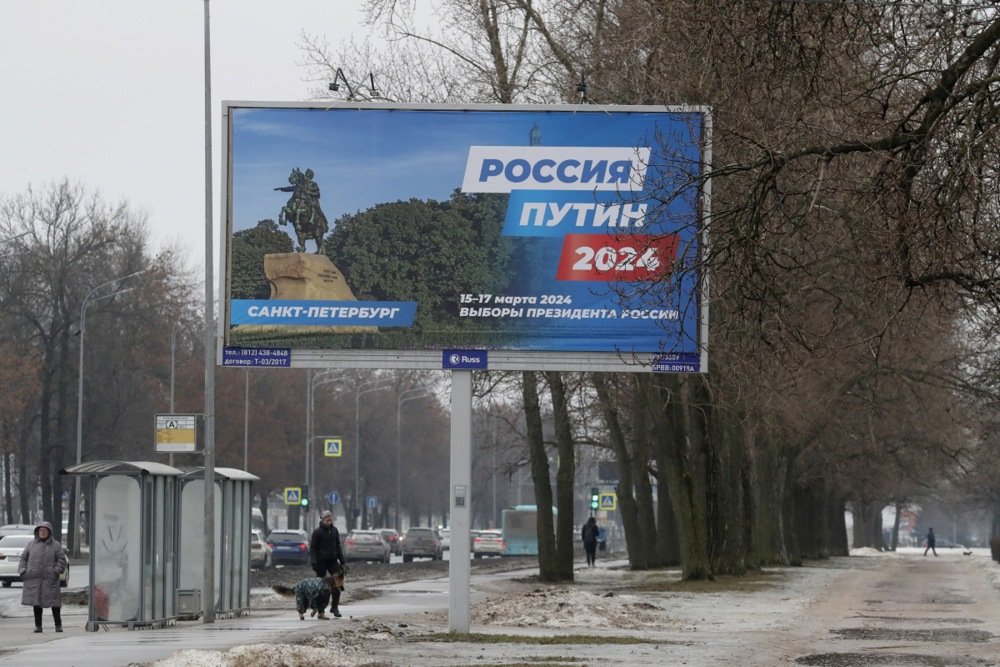With nothing short of a record-breaking landslide in next week’s Russian election being good enough for Putin, the Kremlin is relying on online voting to bridge the gap between reality and delusion.
More than 3 million Russians have already applied to vote online in the presidential election, which begins next Friday, using the country’s remote electronic voting system. It’s now possible for voters to cast their ballots digitally in 27 Russian regions, as well as in annexed Crimea.
The push to register citizens to vote online is causing anxiety nationwide, but particularly in Moscow, where public sector employees face coercion to vote from their superiors and fear that their online votes may be monitored in breach of the constitutional right to privacy, in the interests of the Kremlin achieving its assigned goals on election day.
Russia’s digital dawn
Online voting was first used in Russia in 2019 for Moscow’s regional parliamentary elections. From the start, voter rights NGO Golos expressed concerns about its potential impact on electoral transparency as well as concerns that the software does not allow observers to decrypt and verify votes after polling ends.
“If it were video surveillance, it would be like watching a prerecorded video instead of a live broadcast,”
Golos warned.
Upon its first use five years ago, the online voting system went down and had to be restarted multiple times. At the end of the count, the Moscow mayoral office announced that the digital polling stations had seen a very high turnout and that pro-government candidates had won in all three districts where the vote was held digitally. Despite independent candidate Roman Yuneman receiving more paper ballots than his United Russia counterpart, he ultimately lost the election after online voting was taken into account.
Its technical faults notwithstanding, online voting was approved by Putin for use in all elections from 2020 “on a permanent basis, not as an experiment”, and was used the same year in Moscow and the Nizhny Novgorod region for a referendum to approve a raft of constitutional amendments.
In 2021, online voting was extended for use in seven regions for legislative elections. Online votes clinched wins for nine pro-government candidates who had lost to their political opponents on paper ballots alone. Neither protests nor criticism of the online voting system were able to stem the tide of digitalisation the Russian election system was undergoing.
Disunited Russia
As early as 2023, independent Russian media outlet Meduza reported that the presidential administration was planning on exploiting digital voting to win in this year’s presidential elections. A former political strategist at the Kremlin who spoke on condition of anonymity confirmed that the authorities planned to secure a minimum of 80% of all votes for Putin by promoting online voting to public sector workers and the employees of big corporations.
Online voting will be used in 29 Russian regions, as well as in annexed Crimea, home to voters who are “the most problematic for the authorities” an expert from Golos said, adding that the so-called “electoral sultanates” — the regions in which the ruling party is confident of a large margin of victory — are not using the digital voting system.
The Altai region in Siberia has traditionally opposed Vladmir Putin’s party United Russia, and it is now the region with the third highest number of voters registered to vote online. However, residents have reported being coerced into registering for the scheme; in one instance, employees at a bank were told they had no choice but to vote using online voting. In another, a teacher at a school in the regional capital Barnaul, told Novaya Europe that the school principal coerced employees to register to vote online and published the names of those who hadn’t done so in work group chats.
The Altai region Governor Vikor Tomenko is no stranger to online voting himself. When he was re-elected for a second term with a record 76% of the vote in 2023, reports suggested that public sector employees were made to vote digitally for Tomenko, in some cases allegedly receiving an 800 ruble (€8) bribe for each online vote.

“Russia. Putin. 2024” A billboard announcing the 2024 presidential election in St. Petersburg. Photo: EPA-EFE/ANATOLY MALTSEV
Corralling the capital
Moscow’s public sector employees are being forced to vote electronically on an institutional scale. Speaking anonymously, an employee working for a company half owned by Moscow’s mayoral office told Novaya Europe that they were forced to register for online voting and threatened with “conversations with management” if they refused. On top of that, public sector employees registered in Moscow are being forced to get an additional three people to vote online at the same time, they said.
“It was a campaign, so to speak, ‘Bring three friends.’ New employees only had to register one or two.”
State employees have been told they can’t take annual leave during the elections, both during the presidential elections in March and again in September when a myriad of municipal, regional and gubernatorial elections take place across Russia.
Novaya Europe spoke to a Ministry of Education staffer, also living in Moscow, who said that she experienced no “direct coercion” to register for online voting, but noted that her employers were “solely and constantly advocating for online voting”.
The practice of voting under the supervision of managers at work and bringing family members and acquaintances along to the polling station is becoming more common, according to an expert at Golos.
Novaya Europe’s source close to the Kremlin explained how regional authorities are directed by Moscow to ensure public sector employees vote online. This message reaches the regional public sector who then work to “mobilise” employees.
The efforts made to register public sector employees in these regional areas are not lacking in creativity. Some authorities held competitions; in the south-western Volgograd region, entries who write a song, draw a poster, record a video or even create a slideshow of memes promoting online voting receive a ticket to a concert, and the overall winner receives a paid trip to Moscow. These concerts happen on a regional level but are organised on orders of the presidential administration, the source close to the Kremlin noted.
Electoral mobilisation
The 29 regions where online voting will take place in next week’s election have a combined population of 48 million voters, or around 40% of the general voting population. Judging by registration rates, 10 million people will vote online in these regions, with Moscow’s population, which votes separately using a different platform, adding another 4-5 million names to the digital electoral roll. Not one of these votes will be verifiable, according to Golos co-chair Stanislav Andreychuk.
“There is no sense in counting the votes if we don’t know where they are coming from. To check this we need the code for the software, which only the programmers have. … Experience has also shown that programmers can interfere with the voting in real time.”
Besides being simpler to count the results, there is perhaps another reason why the Kremlin has so doggedly pressed for the widespread uptake of the online voting system — it’s needed to expand the selection of election manipulation tools available for the authorities to maintain total control over the results, up to and including the ability to totally fabricate ballots as necessary, according to political scientist Alexey Gilev.
“Previously, electoral mobilisation was about getting people out to the polls,” he said, explaining that online voting would allow the Kremlin greater control over the result of the elections and adding that public sector employees might vote for Putin for fear that their vote is being watched.
This will all boost Vladimir Putin’s “chances” of victory on 17 March, giving him up to 15 million additional votes, says Stanislav Andreychuk. “The Kremlin will get another 20–25 million votes from the electoral sultanates. The current situation is extremely favourable towards the president who will easily obtain 55–60 million votes.”
Join us in rebuilding Novaya Gazeta Europe
The Russian government has banned independent media. We were forced to leave our country in order to keep doing our job, telling our readers about what is going on Russia, Ukraine and Europe.
We will continue fighting against warfare and dictatorship. We believe that freedom of speech is the most efficient antidote against tyranny. Support us financially to help us fight for peace and freedom.
By clicking the Support button, you agree to the processing of your personal data.
To cancel a regular donation, please write to [email protected]

